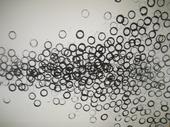Philosophy is an intimidating word for many, however, our culture and our perception are based on philosophical assumptions that once unveiled, can show us fascinating aspects of our beliefs about ourselves and the world.
Here, in the West, we inherit a certain assumption about humanity that is based on “being”. But, what is it “to be”? Most of us think of actual physical presence as being, but, philosophy asks, what is the foundation for our perceptions of this external world, and also of our internal, subjective experiences? How is it that we think we know what is going on with our existence?
Traditionally, here in the West, we believe we know what is going on when we “understand” something about it. Now we must ask, how do we create understanding? The short, traditional answer is mind. We have assumed that mind can commune with the foundation of our perceptions, and that the foundation of our perceptions is being. Tuning into being allows us to understand.
While being does have a long and varied philosophical history, over the centuries, it has taken on a certain identity of structure and order, an order that is mirrored by human understanding. This so-called “understanding” has been limited, largely, to mind and mind has been narrowed to intellect, and intellect is thought to be ruled best by “rational capacity” or by the principles that constitute Logic, the science of correct thinking.
Over the centuries, philosophy, which has the demonstrated potential to be much wider than “rational inquiry” has become restricted to it.
This project challenges this fundamental assumption about being and understanding. Logic and rational thinking are incredibly useful, and this project does not attempt to denounce them as useless. However, it advocates the notion that rational thinking can be aided by leaving room for and by valuing that which is outside our rational understanding – the unknown, the mystery, the beyond – as is. Philosophy, even here in the West, historically has been informed by such a view, even though now it is considered quite questionable.
Leaving room for the “beyond intellectual understanding” involves respecting a sort of seeing that is not derived through rational inquiry and explanation. This seeing is not synonymous with understanding. Instead, it is more of allowing “not knowing” to be the basis of our existence. Within this project, being becomes something more than logical order, or rational structure. While it may carry them as possibilities, it itself is always already “beyond intellect”.
Impressions of our existence, of being, can be sensed outside of our intellect. These impressions, if we allow them, can then impact our intellectual endeavors. This project delivers impressions I received after studying philosophy of the body and language, impressions that lost their information when formulated into rational explanation.
